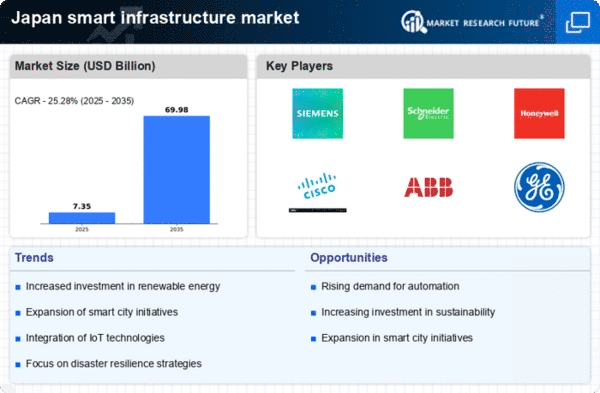Public Awareness and Acceptance
Public awareness and acceptance of smart infrastructure technologies are crucial for market growth in Japan. As citizens become more informed about the benefits of smart solutions, such as improved safety, convenience, and environmental sustainability, their willingness to embrace these technologies increases. Surveys indicate that over 70% of the population supports the implementation of smart city initiatives, reflecting a positive outlook towards innovation in urban infrastructure. This growing acceptance is likely to encourage local governments and private entities to invest in the smart infrastructure market, fostering a collaborative environment for the development and deployment of advanced technologies.
Technological Advancements in IoT
The proliferation of Internet of Things (IoT) technologies is a key driver for the smart infrastructure market in Japan. As IoT devices become increasingly sophisticated and affordable, their integration into infrastructure systems enhances operational efficiency and data collection. For example, smart sensors and connected devices facilitate real-time monitoring of traffic, energy consumption, and environmental conditions. According to recent estimates, the IoT market in Japan is projected to reach ¥4 trillion by 2025, indicating a robust demand for smart infrastructure solutions. This technological evolution not only improves service delivery but also supports the development of intelligent transportation systems, which are crucial for urban planning and management.
Government Initiatives and Funding
The Japanese government actively promotes the smart infrastructure market through various initiatives and funding programs. With a focus on enhancing urban mobility and energy efficiency, the government has allocated substantial budgets to support smart city projects. For instance, the Ministry of Land, Infrastructure, Transport and Tourism has earmarked approximately ¥1 trillion for infrastructure upgrades, which includes smart technologies. This financial backing is likely to stimulate innovation and attract private sector investments, thereby accelerating the growth of the smart infrastructure market. Furthermore, the government's commitment to achieving carbon neutrality by 2050 aligns with the adoption of smart infrastructure solutions, which are essential for reducing emissions and improving resource management.
Urbanization and Population Growth
Japan's ongoing urbanization and population growth significantly impact the smart infrastructure market. As urban areas expand, the demand for efficient transportation, energy, and waste management systems intensifies. The population in major cities like Tokyo is expected to reach approximately 14 million by 2025, necessitating innovative infrastructure solutions to accommodate this growth. The smart infrastructure market is poised to address these challenges by implementing advanced technologies that optimize resource allocation and enhance urban living conditions. Moreover, the increasing density of urban populations drives the need for sustainable practices, further propelling the adoption of smart infrastructure initiatives.
Rising Demand for Energy Efficiency
The quest for energy efficiency is a driver in the smart infrastructure market. Japan's commitment to reducing energy consumption and greenhouse gas emissions has led to a surge in demand for smart energy management systems. These systems utilize advanced analytics and automation to optimize energy use in buildings and public infrastructure. Recent data indicates that energy-efficient technologies could reduce energy consumption by up to 30% in urban areas. This trend aligns with Japan's broader sustainability goals and encourages investments in smart infrastructure solutions that promote renewable energy sources and energy conservation practices.
















